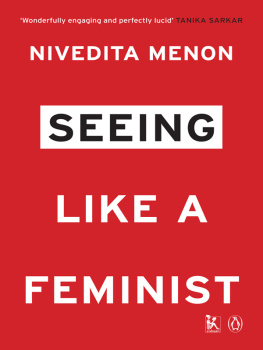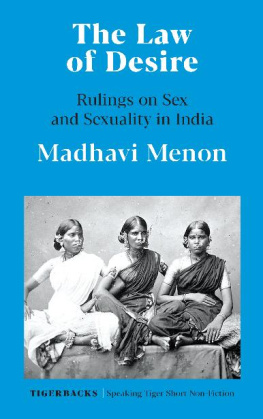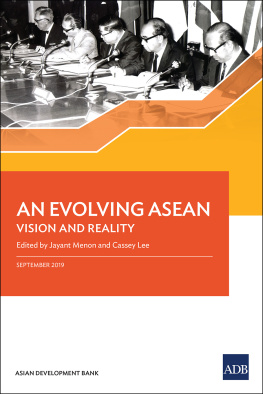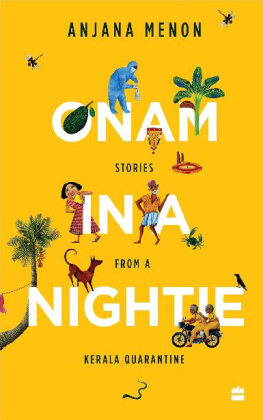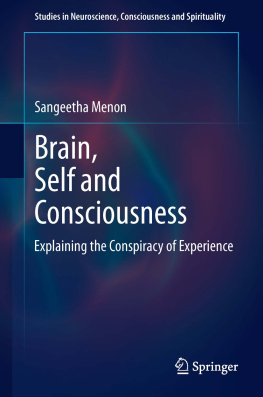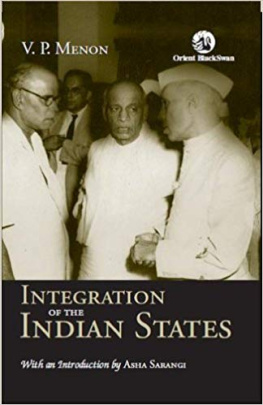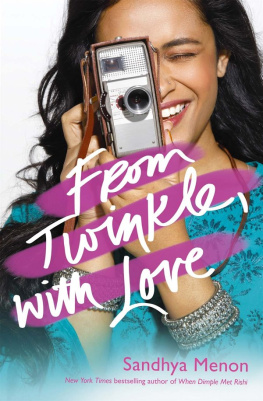Nivedita Menon - Seeing Like a Feminist
Here you can read online Nivedita Menon - Seeing Like a Feminist full text of the book (entire story) in english for free. Download pdf and epub, get meaning, cover and reviews about this ebook. year: 2012, publisher: Penguin Books Ltd, genre: Home and family. Description of the work, (preface) as well as reviews are available. Best literature library LitArk.com created for fans of good reading and offers a wide selection of genres:
Romance novel
Science fiction
Adventure
Detective
Science
History
Home and family
Prose
Art
Politics
Computer
Non-fiction
Religion
Business
Children
Humor
Choose a favorite category and find really read worthwhile books. Enjoy immersion in the world of imagination, feel the emotions of the characters or learn something new for yourself, make an fascinating discovery.
- Book:Seeing Like a Feminist
- Author:
- Publisher:Penguin Books Ltd
- Genre:
- Year:2012
- Rating:5 / 5
- Favourites:Add to favourites
- Your mark:
- 100
- 1
- 2
- 3
- 4
- 5
Seeing Like a Feminist: summary, description and annotation
We offer to read an annotation, description, summary or preface (depends on what the author of the book "Seeing Like a Feminist" wrote himself). If you haven't found the necessary information about the book — write in the comments, we will try to find it.
Seeing Like a Feminist — read online for free the complete book (whole text) full work
Below is the text of the book, divided by pages. System saving the place of the last page read, allows you to conveniently read the book "Seeing Like a Feminist" online for free, without having to search again every time where you left off. Put a bookmark, and you can go to the page where you finished reading at any time.
Font size:
Interval:
Bookmark:


ZUBAANPENGUIN BOOKS
Nivedita Menon teaches Political Thought at Jawaharlal Nehru University, Delhi. Her previous books include Recovering Subversion: Feminist Politics Beyond the Law (2004); an edited volume, Sexualities (2007); and Power and Contestation: India after 1989 (2007, co-authored with Aditya Nigam). An active commentator on the blog kafila.org , she has also translated fiction and non-fiction from Hindi and Malayalam into English. She has been active with citizens forums in Delhi on secularism, workers and womens rights, sexuality, and in opposition to the nuclear bomb.
Nivedita Menon combines a highly complex conceptualization of feminist theories and practices with a wonderfully engaging and perfectly lucid style of writing. She frames the debates within a rich understanding of larger socio-political processes, and reveals the interfaces between the two.Tanika Sarkar
Have you heard of nude make-up?
This is what it is:
Nude make-up looks are all about your skin looking fresh and dewy, without looking like youre even wearing any make-up. All you need is eyeliner, mascara, nude lipstick, and a highlighting blush that will give your skin a natural-looking glow.
The whole point of nude make-up, clearly, is to spend hours painting your face in order to make it look like you had not touched it at all.
The maintaining of social order is rather like that. It requires the faithful performance of prescribed rituals over and over again throughout ones lifetime. Complex networks of cultural reproduction are dedicated to this sole purpose. But the ultimate goal of all this unceasing activity is to produce the effect of untouched naturalness.
When one sees the world like a feminist though, with the gaze of a feminist, its rather like activating the Reveal Formatting function in Microsoft Word. It reveals the strenuous, complex formatting that goes on below the surface of what looked smooth and complete.
What do I mean by feminism? A feminist perspective recognizes that the hierarchical organizing of the world around gender is key to maintaining social order; that to live lives marked male and female is to live different realities. But simultaneously, to be a feminist is to imagine occupying the marginal, relatively powerless position with reference to every dominant framework that swallows up the space at the centre. For instance, any possible female reader of this book would be in a relatively powerful position with regard to the working-class men she interacts with dailythe auto rickshaw driver, the janitor, the domestic servant; and if she is an upper-caste Hindu in India, or a white American anywhere, with regard to men who are not. At the same time, she would experience her relative powerlessness as a woman if faced by a man in a position to attack her sexually, regardless of his class or caste; or when she compares her life choices and autonomy with those of a man of her class. Needless to say, it is not only women who can adopt feminism as a political stance and way of life, but men who choose to do this have to take a stand against the privileges that they could otherwise take for granted.
Feminism is thus not about individual men and women, but about understanding the ways in which men and women are produced and inserted into patriarchies that differ according to time and place. My title is inspired by James Scotts Seeing like a State, but there is a crucial difference in the way seeing operates in the two instances. Scott uses the metaphor of seeing to indicate the ways in which a modern state makes heterogeneous practices legible to itself in order to control them. Thus, the States seeing is invested with enormous power, because when it sees an identity, it is making that identity real, its seeing is simultaneously ordering society. On the contrary, when a feminist sees from the position of marginality he or she has deliberately chosen to occupy, it is a gesture of subversion towards power; it disorganizes and disorders the settled field, resists homogenization, and opens up multiple possibilities rather than close them off.
To be a feminist is to understand that different identitieslocated hierarchically as dominant or subordinateare produced at different times and in different spaces, but also to be aware particularly of the processes of gendering. By gendering, I mean the ways in which people are produced as proper men and women through rules and regulations of different sorts; some of which we internalize, some which have to be violently enforced. To be a feminist is to recognize that, apart from gender-based injustice, there are multiple structural inequalities that underlie the social order, and to believe that change is possible, and to work for it at whichever level possible. Feminism is not an organization that one formally joins, and it can never be the isolated achievement of individual women. To be a feminist is to feel part of the history that has produced us; it is to insert oneself into two centuries of thick, textured narratives of struggles and celebrations that transcend national boundaries; to hear the strains of songs of anger and sorrow and militancy in many tongues; to remember our heroines, our foremothers; and, above all, to feel an enormous sense of continuing responsibility.
Is this book about India? I think not. When we read Germaine Greers The Female Eunuch or Simone de Beauvoirs The Second Sex or bell hooks Feminism is for Everybody (I mention these iconic feminist texts in conjunction with mine in all humility, only because they would be familiar to many readers), we do not assume that they are writing about Australia or France or the US. Rather, we see them as theorizing from their own location to make arguments about women and patriarchy in general, and while some of their arguments work in plural contexts, others do not. In this book, I draw on feminist scholarship and feminist politics in my part of the world to set up conversations with feminist debates and experiences globally. The key difference may be that, when we in the non-West theorize on the basis of our experiences, we rarely assume that these are generalizable everywhere. But we do believe that comparisons and engagements with other feminisms are not only possible, but unavoidable. Which is why, in this book, I often assume and address the lively global feminist voices that surround us. And when I say we, I generally mean feminists.
Let me reiterate, then, that my focus in this book is feminist politics and feminist ways of seeing the operation of gendered modes of power. So it is not about women in politics. In India today, the political scene is marked by fiery, independent, militant womenMedha Patkar in the struggle against ecologically unsustainable and unjust capitalist development; Irom Sharmila, force-fed under arrest for over eleven years by the Indian State, as she continues her fast for the repeal of the Armed Forces (Special Powers) Act, the law that enables her state of Manipur and the North-East of India in general to be treated as occupied territory; Mayawati, the Dalit leader of one of the most powerful organizations of Dalits in India, the Bahujan Samaj Partyto name but three. On the other hand, there is active participation by women in Hindu right-wing and upper-caste anti-reservation politics, ecological movements and land struggles, as well as in armed Maoist movements. All these can be (and have been) studied from a feminist point of view, but that is not my project here because here, I limit myself to engaging only with ideas and activism that themselves directly address gendered modes of power today.
Font size:
Interval:
Bookmark:
Similar books «Seeing Like a Feminist»
Look at similar books to Seeing Like a Feminist. We have selected literature similar in name and meaning in the hope of providing readers with more options to find new, interesting, not yet read works.
Discussion, reviews of the book Seeing Like a Feminist and just readers' own opinions. Leave your comments, write what you think about the work, its meaning or the main characters. Specify what exactly you liked and what you didn't like, and why you think so.

